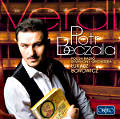ORFEO International – Reviews
Important Releases Briefly Introduced
March 2013
ORFEO 1 CD C 865 131 A
Verdi - Piotr Beczala
The internationally renowned tenor Piotr Beczala celebrates the 200th anniversary of Giuseppe Verdi’s birth with a collection of highlights that include the roles in which he has for years been acclaimed on the world’s great operatic stages. 
Piotr Beczala
Foto: Johannes IfkovitsThis new CD with Beczala and the Polish Radio Symphony Orchestra under Lukas Borowicz goes one step further, however. For besides roles for which he is famous, such as the Duke in Rigoletto or Alfredo in La traviata (in which Beczala has enjoyed equal success at the Met, in Covent Garden and at the Bavarian State Opera), Beczala here offers rarities and arias that were ground-breaking at the time. 
C 865 131 AThus he sings Radamès’s opening aria from Aïda, striking the exact balance necessary between the drama and the interiority of expression that makes this romance (and indeed the whole role) as charming as it is difficult. The same is true of the role of Manrico in Il trovatore. Beczala does not just sing his aria “Ah sì, ben mio” on this CD, but also his big scene with Azucena from the second part of the opera. His partner here is Ewa Podleś, whose dark yet brilliant contralto voice offers a fascinating contrast to Beczala’s ever-radiant, well-focussed tenor. The recording closes with the friendship duet from Don Carlo, which Beczala crowns with a superb top C. Here, he is partnered by the baritone Mariusz Kwiecien as Posa, who thereby adds another beautiful vocal timbre to the recording. In arias from Macbeth and Un ballo in maschera from the more melancholy side of the repertoire, Beczala utilizes to the full the possibilities they offer for subtle shadings. Since his spectacular debut at the Lindenoper in Berlin and a première at the Zurich Opera that was his home for many years, this Polish tenor has been virtually synonymous with the protagonist of Un ballo in maschera. Beczala changes genre for the “Ingemisco” from Verdi’s Requiem (unless one shares the opinion that this requiem mass is in fact Verdi’s best “opera”), in which he brings to expression the trajectory from humility to hope that is intrinsic to it. Variety is also guaranteed by the selection of tenor arias from rarely performed Verdi operas such as Les vêpres siciliennes and I Lombardi alla prima crociata, in which Piotr Beczala once again demonstrates the lissom elegance of his phrasing.
top |